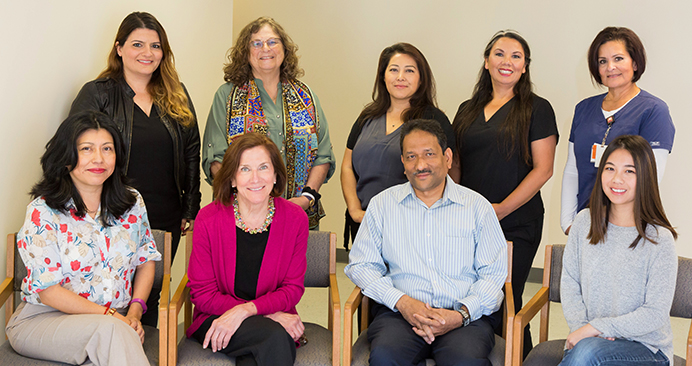MCA Research

Current Studies
Natural History and Long-Term Health Outcomes Study
The MCA Natural History Study is a point-of-care study of HIV disease, co-infections and comorbidities that has been ongoing since 1988. All MCA patients are asked to participate and informed consent is obtained to gather data from their medical records and to collect specimens for future analysis. The study goals are to monitor and evaluate the effect of clinical and behavioral, virologic and immunologic factors on the transmission and pathogenesis of HIV and concomitant infections in HIV-infected women and their infants, older HIV-infected children, adolescents who acquire HIV through adult behaviors, and the sexual partners of HIV-infected individuals. Over 2,000 patients have enrolled. This large longitudinal study has formed the basis for many faculty, student, resident and fellow projects resulting in independent funding and numerous publications.
NIH International Maternal Pediatric and Adolescent AIDS Clinical Trials Group (IMPAACT)
The IMPAACT Network is a cooperative group of institutions, investigators, and other collaborators focused on evaluating potential therapies for HIV infection and its related symptoms in infants, children, adolescents, and pregnant women, including clinical trials of HIV/AIDS interventions for and prevention of mother-to-child transmission. The IMPAACT Network collaborates with the NICHD Domestic and International Pediatric/Maternal HIV Clinical Studies Network, the Adolescent Medicine Trials Network for HIV/AIDS Interventions, and with other NICHD-, NIH-, and organization-led HIV/AIDS research networks and projects.
MCA is currently participating in following types of IMPAACT studies:
- Trials to prevent maternal-to-child transmission among high risk neonates:
- Phase I safety and tolerability through 6 weeks of life of raltegravir oral granules for suspension
- Phase I multicenter trial to determine the safety and pharmacokinetics of VRC01, a potent anti-HIV neutralizing monoclonal antibody in HIV- exposed infants
- Phase I/II multi-center proof-of-concept study examining early intensive antiretroviral therapy to achieve HIV remission in neonates
- Trials for HIV-infected pregnant women:
- Phase IV open-label randomized study of ARV-naïve (except for ARVs for PMTCT in previous pregnancies) pregnant women between 28 and 36 weeks gestation and their infants
- Phase IV prospective pharmacokinetic (PK) study of selected ARV drugs currently used in clinical care during pregnancy and postpartum
- Vaccine trials:
- Phase I placebo-controlled study of the infectivity, safety and immunogenicity of a single dose of a recombinant live-attenuated respiratory syncytial virus (RSV) vaccine delivered as nose drops to RSV-seronegative infants 6 to 24 months of age
- Studies in HIV-infected children and adolescents:
- Evaluating new ARV drugs in infants, children and adolescents
NIH Pediatric HIV/AIDS Cohort Study (PHACS) and the Surveillance Monitoring for ART Toxicities (SMARTT) study
22 clinical sites across 12 states and Puerto Rico participate in PHACS, a longitudinal cohort study investigating the long-term effects of HIV infection and ARV (antiretroviral) medications in children and young adults who were born with HIV or exposed to HIV. The study follows newborns, young children, adolescents, and young adults.
18 sites (including MCA) participate in SMARTT, a longitudinal “surveillance” study examining uninfected children born to mothers with HIV. The goal is to assess the long-term safety of fetal and neonatal exposure to prophylactic ARV chemotherapy. Children are seen annually to identify signals for potential abnormalities including metabolic, growth, cardiac, neurologic, neurodevelopmental, behavior, language, and hearing domains. If a signal is identified, further evaluations are done to identify an abnormality. The primary caregiver for the child is also enrolled and asked to complete questionnaires.
PHACS works in collaboration with a number of other research networks including IMPAACT, the Collaborative Initiative for Pediatric HIV Education and Research (CIPHER), the Adolescent Trials Network (ATN), and the Office of HIV/AIDS Network Coordination (HANC).
As of March 2017, 85 peer reviewed publications and abstracts have been published from PHACS: https://phacsstudy.org/.